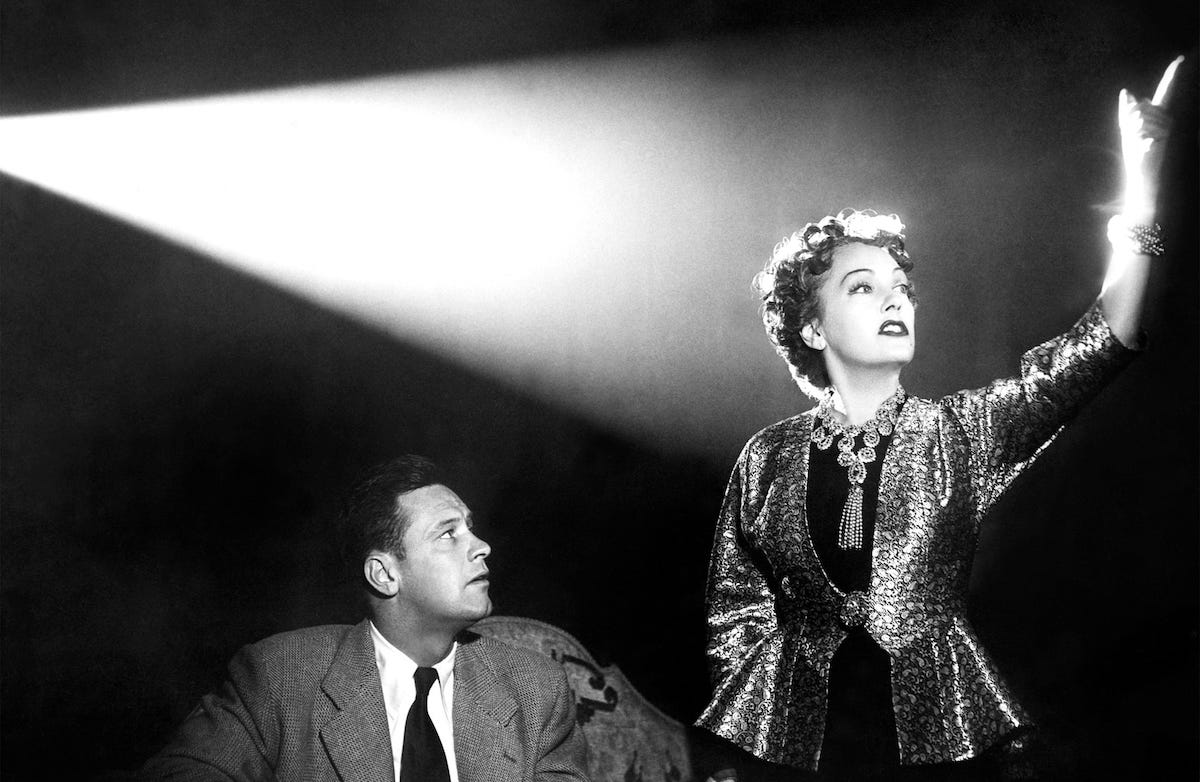Last New Year’s Eve, I wrote about Billy Wilder’s The Apartment. It’s the best movie on the ambivalence with which we welcome the end of one year and the coming of a new one, worrying whether it promises that our dreams will come true, whether we will live up to our resolutions to be better. This year I’ll take up that subject with Wilder’s most famous movie, Sunset Blvd. (1950), a story, almost a film noir, about trying to live the American dream in Hollywood rather than Manhattan, the setting for The Apartment.
Maybe it’s best to start with this contrast between the two coasts of America, once symbols of the past and the future. Jack Lemmon is the sad sack protagonist in The Apartment, alone in an overcrowded metropolis with a rather strict hierarchy symbolized by the skyscraper, the climbing of which debases his character. William Holden in Sunset Blvd. is a confident, cynical screenwriter trying to make it to success in an industry that seems to be nothing but puzzles. Who knows what the public will like? This makes life seem a game of chance.
The glamour of L.A. is nothing as inaccessible as NYC, but the endless expanse of canyons conceals so much that you’re bound to get lost. One place is as crammed and vertically expanding as the other is sparsely populated and endlessly unfolding horizontally. On the East Coast, an apartment in a row house is Lemmon’s prized possession; on the West Coast, Holden is busy trying to save his car from the repo men because he’s behind on his payments.
California in the movie looks like American freedom: beautiful, bustling with activity, full of the promise of the postwar era. But Hollywood especially is not a happy place, precisely because it sells fantasies of happiness to the nation. It’s not just that it’s not easy to find work; it’s how fickle it all is. Maybe selling fantasies means you live in a fantasy. The love that creates stars is the opposite of what we call meritocracy.
It’s certainly not working out for our protagonist. Holden is just about washed up even though he’s in his prime. At the beginning of the film, he’s desperate for work. His agent, who seems already to be enjoying paradise, despises him as a nuisance in the middle of his golf game. The only producer to whom he has access, a man full of worries, lets a young lady mock him. She’s a script reader who thinks he’s got nothing but clichés to offer, and maybe she’s right. He ended up that way by trying to please. He went from cocky to cynical when he learned that nobody cares about his talent or aspirations and that, absent success, he might as well not exist.
This is a harsh lesson to learn, but many have learned it. It’s time for our protagonist to hit the road back to the America whence he came, back to the paper where he started, but he feels humiliated by the prospect. He thinks, too, of everyone back home. He impressed them by leaving for Hollywood and getting some script work in pictures that actually got made. They would resent him for daring to rise above them and mock him for falling back to their level. His own ambition, moreover, won’t allow him to try to live an ordinary American life. It goes without saying: He now has no family.
As with any great movie, properly attending to the introductory sequences of Sunset Blvd. reveals, even more than an overture would for an opera, the great drama about to unfold. Billy Wilder brings out of the details of ordinary business life a grand tale of the desperate ambition of a beautiful man, artistic and vigorous. Then he adds the touches of noir, which he had perfected in Double Indemnity (1944), by making it a crime story and having the protagonist narrate it. This role is almost a religious one—in the opening shots, after all, he looks down at himself, dead on-screen, and pronounces a judgment, in voice-over. It’s a confession, too. We are also invited to judge this life and this death.
The occasion for the drama seems a strange combination of the mundane, even sordid, and the fairy tale. Holden is on the run from the repo men, and after a car chase ends up in a driveway on Sunset Blvd. with a tire blown but a chance to hide the vehicle on what looks like an abandoned property. But it’s also leaving the sunny California we’d seen before and finding a European palatial ruin in the virgin American land. How is this possible? He’s entered, unwittingly, a fantasy world—the world of the silent pictures, full of drama and appeals to awe. It might as well be Dracula’s castle.
Here he meets, initially with amusement and distaste, Norma Desmond, once a silver screen queen. She is ugly and looks menacing, but was once worshipped by men and by millions, wealthy beyond the dreams of avarice because of her beauty and her commanding contempt for everyone staring up at her. She was not in show business—she was an idol in an attempted cult. Men were willing to commit suicide for her or dedicate their lives to her. The exalted, not just the sordid, welcomes Holden in this other world where he might learn the truth about the origins of Hollywood.
Holden becomes a scriptwriter, a companion, even a servant to this woman, lost in the glamorous past for which he longed. Fitting punishment for his hubris. Yet there is a shining moment in the story. After a depressing New Year’s Eve party in the morbid palace, Holden escapes to a friend’s party full of young people, hopeful and joyous, noisy and cramped with people eager to be together, who have left the business of the movies aside to celebrate. He meets the script reader again, a pretty young woman, Betty (Nancy Olson). Gradually, they fall in love and write a script together, based on the America he knew when he grew up. That memory, properly dramatized, could make for a great movie, or at least make him successful and in a way redeem him, as could this young woman’s innocent love.
Yet New Year’s Eve is a very ambivalent celebration, so full of hints of our mortality. Holden lets go of his cynicism in working and falling in love with Betty, her decency reminding him of the bracing character and the rewards of an honest life. Yet Wilder refuses us the happy ends we wish for, especially at the end of the year. Holden is doomed precisely by his encounter with this angelic figure. Her beauty can replace the glamour but not the corruption of Hollywood. She is above the sordid realities he’s stuck with. Whereas The Apartment leaves its humbled protagonists together and in love, Sunset Blvd. ends in madness and crime. We see the consequences of living in a fantasy, leaving reality behind. I think Wilder wants us to reflect on the dangers Hollywood poses to national sanity, since it attracts so many people who go mad there staring at the beautiful visions on their screens.
Happy New Year. May the next one be … saner.

